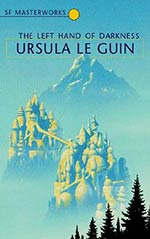
![]() BookWithoutPics
BookWithoutPics
6/19/2012
![]()
This review first appeared at:
http://bookswithoutanypictures.wordpress.com/2011/12/01/the-left-hand-of-darkness-by-ursula-k-leguin/
Ursula K. Le Guin is phenomenal. A few months ago, I read her novel "The Telling" and loved the anthropological manner in which she describes the culture of her sci-fi worlds. I had heard good things about "The Left Hand of Darkness," and was not disappointed. It is now one of my favorite books of all time.
In a futuristic world, Earth has joined other planets in a collaboration known as the Ekumen, an intergalactic group facilitating diplomacy and trade between worlds. The Ekumen contacts new planets by sending a lone representative to try to convince them of the merits of joining, on the principle that one person is somewhat innocuous, whereas two people could be interpreted as an invasion.
"The Left Hand of Darkness" tells the story of Genly Ai, a man from Earth who is sent to the planet Winter as the first representative of the Ekumen. The people on Winter don't have the same gender divisions that we do, but rather are completely androgynous. They are only capable of sex during a short period each month known as kemmer, at which point they assume either masculine or feminine genitalia. On Winter, normal humans such as ourselves are considered to be perverts, because their sexual instincts are never able to be turned off, and they are confined to one gender. Because of these differences, the social climate of Winter is vastly different than that of Earth. Rather than viewing the world as a dichotomy, denizens of Winter choose to live in the moment and focus on the greater whole. Le Guin makes us question the role of gender in shaping society and culture, while at the same time questioning how much of Winter's culture is instead shaped by the planet's harsh climate.
Genly Ai must navigate the subtleties and politics of the countries of Winter in order to convince its leaders to join the Ekumen. While doing so, he must to put aside his own preconceived notions of society and learn to adapt to a new planet, which is easier said than done, as Winter is still in the middle of an ice age.
Le Guin does a masterful job of worldbuilding, creating an entire mythology and history for the planet. Her descriptions of the icy world are vivid and breathtaking.
I'd highly recommend this book. Le Guin is the kind of author who can tell a beautiful story while at the same time constantly make you think about your own perceptions of reality. If you get the edition that I have pictured, I'd also suggest reading the author's introduction to the novel, as it's quite good. It describes her own views on science fiction, and is interesting to keep in mind while reading.
http://bookswithoutanypictures.wordpress.com